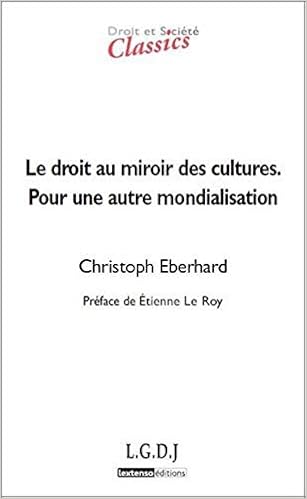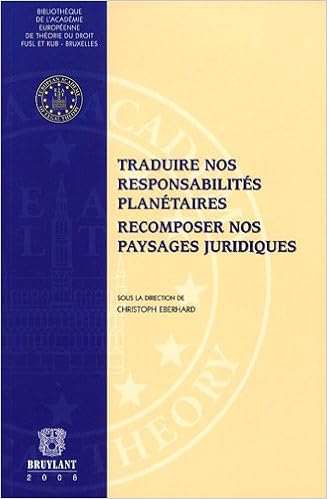Will the global pandemic foster the emergence of global governance?
Posted by Michel Morvan on
For over thirty years, Christoph Eberhard has divided his life between yoga , martial arts and... legal anthropology .
His work is built around a simple, increasingly pressing question : in a world that has become a village, how can we reconcile the diversity of cultures and ways of thinking with the need to succeed in acting together on a global scale ?
The challenge that Christoph Eberhard relentlessly pursues is nothing less than defining the terms of the debate that will allow all the inhabitants of planet Earth to live together in mutual respect and peace , but without erasing their differences .
As you might expect, these terms should not be those of business or Hollywood , nor even catch-all notions that are strongly anchored in Western culture, but not necessarily in others, such as democracy or human rights .
The climate emergency seemed to be accelerating the emergence of a collective thinking necessary for common action ... until the pandemic did even better, forcing the global village to focus in spite of itself on the same subject, at the same time.
[Chemins de tr@verse] The pandemic has brutally highlighted the contrast between the emergence of global problems and the implementation of local responses, which are not very effective in taking global action. Do you think that this crisis will be conducive to raising awareness of the need for global governance mechanisms?
[Christoph Eberhard] Globalization has made our ecosystem – in the broad sense, our living environment – extremely interdependent. And in doing so, it has also become extremely fragile. A glitch on the other side of the planet directly impacts our lives. Growing interconnectedness has a multiplier effect on our fragilities: a large part of our food comes from the four corners of the world and sometimes travels across the planet before arriving on our plates. The pandemic has also illustrated the dependence on other countries for access to medicines (vaccines) and medical equipment (masks), which works when everything is working, but proves problematic in a crisis situation.
Not to mention the fact that it is our extreme interconnectedness that today allows a virus to travel around the world in a matter of hours, making us vulnerable to pandemics.
I am not very optimistic about the awareness of the issues for global governance. On the other hand, it seems to me that there is an awareness of the need for a certain degree of local autonomy and of the excesses of excessive globalization. The international division of labor seems to need to be rethought. The problem is that this awareness often results in identity withdrawal and nationalism that is exacerbated. In France, even before the pandemic, there was the yellow vest movement. Our societies are in deep crisis. During crises, it is difficult to look far ahead. We are confronted with current problems... and we look for scapegoats... including globalization.
The problems are not just about “governance”. The underlying question is: what kind of world do we want to live in? How can we rethink our modes of production and distribution?
Questions about sustainable development, even degrowth or voluntary simplicity are being put back on the table. But are we really going to take them seriously? Are we really going to draw conclusions from what we know?
Some believe that the pandemic can play a revealing role, or even a wake-up call. It is possible. But history has also shown (following the plague in Europe, for example, or following wars) that human beings like to party when they come out of a crisis. When we come out of the current crisis, will we have learned something from it… or will we be trying to “make up for lost time”?
[CdT] Interculturality is a key concept in your work. It is only by reconciling the intangible and potentially conflicting elements of different cultures that we will succeed in building a harmonious living together. Do the fight against illness and death escape the concept of interculturality and allow common visions to emerge?
[CE] Nothing escapes our cultural representations, including illness and death. Is illness individual? Is it a symptom in a particular being of a malaise in a community, or even in a given ecosystem? Is death an absolute end, a passage to a life beyond, a transition to other lives in an incessant cycle of rebirths? What is a human being? What is life? All cultures provide their own answer. In India, one of the important traditional medicines is Ayurveda, the "science of life". It is not a science of illness, but a science of life. Illness is perceived as the disruption of a balance, of a harmony that must be restored. Chinese medicine shares this vision. The good Chinese doctor, traditionally, was the one whose "patient" was not sick - all the work is in nourishing and balancing life to be healthy, "at ease", and not in "dis-ease". So illness and death take on different dimensions. A long time ago I participated in a conference on sustainable development in India. In the evening, while continuing to discuss with an Indian researcher, he told me: "Fundamentally, everything is a problem of dharma. We no longer follow dharma. If we continue like this, harmony will be broken. Humanity will disappear. The forest will come back." I did not fully grasp this vision at the time. I understand it better now. Dharma is the cosmic order, what maintains the universe. Dharma is individualized in each being, in its svadharma. Each being has its role to play in the great cosmic symphony. It must play its part accurately. If he doesn’t, it creates disharmony. If there is too much disharmony, the cosmic symphony becomes a cacophony – chaos sets in and the cosmos collapses. Translating dharma into French is difficult. Beyond its cosmic meaning, dharma can mean “responsibility”, “religion”, “path”. Dharma has a strong ethical aspect: lying, for example, goes against dharma and creates adharma, “non-dharma”. What could be the link between our individual ethical behaviours and the broader balance of our ecosystems? I have thought a lot about this Indian vision. And little by little, I understand the wisdom of this vision: lying, being selfish, caring primarily for one’s own survival and increasing one’s power, multiplied by millions and millions of beings creates imbalances with impacts on our entire planet. It is worth meditating on these questions. Does intercultural dialogue allow for the emergence of common visions? I don’t know. But it can enrich our approaches to life and our existential questions.
[CdT] Dialogue is another of your key concepts. Do you feel that dialogue between cultures is progressing during this crisis, since we are all facing the same adversary at the same time?
[CE] No, not particularly. Most of the dialogues related to the pandemic are taking place within the framework of modern science and politics. It is not because various countries have to coordinate that there is really an emergence of an intercultural dialogue in the deep sense of the term. For example, if we take your previous question and the example I gave above concerning dharma: have we even begun to ask ourselves the questions of life, illness, death in an intercultural dialogue? Are we even aware that in India, one of the great emerging powers, there is this notion of dharma and a whole cosmovision linked to it and that looking at what is happening from this point of view would reveal a very different picture? Not to mention the multitude of other visions of the world and of life that exist?
I recommend reading Vandana Shaiva's books to get an illustration of what a radical questioning of our current ways of living (especially with regard to the agro-industrial complex) can be, not only by criticizing the dominant modern paradigm, but by opening up to a dialogue with another vision of the world, in her case the Indian vision. In her book Food Terrorism , there is a very interesting chapter on mad cows and sacred cows – I always had my students read it in my Law, Governance and Sustainable Development course that I taught at Saint Louis University in Brussels. It gives an idea of what an intercultural dialogue could look like. It is very destabilizing. As Robert Vachon, one of my great friends and inspiration who dedicated his life to intercultural dialogue at the Intercultural Institute of Montreal, said: "Intercultural dialogue is crucifying but liberating."
On another note: with the pandemic, virtual meetings on Zoom, online training, and teleworking are increasing. I have never been so in demand to attend seminars held all over the world. On a superficial level, one might have the impression that this increase in virtual exchanges increases intercultural dialogue. But the quantitative multiplication of exchanges says nothing about the quality of these exchanges and their depth. Too much exchange kills exchange... not to mention the context of these exchanges. To borrow the words of Étienne Le Roy, my thesis director in the anthropology of Law and one of the founders of the anthropology of French-speaking Law, modern technologies risk transforming us into "voyeurs" rather than "seers".
[CdT] Major international institutions have been both highlighted, like the WHO, and shaken, like the UN or the EU, by the pandemic and the need to deal with it on a supranational scale. Which multinational organizations do you think will emerge stronger from this crisis?
[CE] I don't know. I hope that the crisis will help to raise awareness of the importance of the general interest, of the notion of public service and of the important role that States have to play in organising our living together. The private sector cannot take charge of everything and the fact of increasingly offloading onto it poses major problems. Politics is not limited to economic efficiency. Do we still have the capacity to do politics in the noble sense of the term? To define projects for society? To try to implement them with the help of public institutions?
[CdT] In the end, is Covid-19 an opportunity for world peace?
[CE] I don't know. What is certain is that Covid 19 is putting us in crisis. At best, a crisis can lead to renewal and a "rebirth" at a more conscious, more integrated level. In the circle of my acquaintances, for some the crisis has helped to refocus, to redefine their priorities, their life choices. To become aware of the importance of social relationships, friends, nature, culture, etc. For others, it has above all been an endless crisis, causing them to lose family members, friends (who have died), their livelihoods, the meaning of their lives and the possibility of planning for the future. Many people were already living in great fragility, even precariousness, before the crisis. Their situations have worsened and the hope of better days is fading more and more every day. So I am really not sure that this pandemic is an opportunity for world peace. But it can be an opportunity for each of us to seriously ask ourselves about the meaning of our lives: in what world do we want to live and what does that imply in relation to our life choices? If peace is important to us, we must become peacemakers. As Raimon Panikkar, another of my great inspirations in the intercultural field, said, playing on the saying, si vis pacem para bellum (if you want peace, prepare for war): si vis pacem, para te ipsum : if you want peace, prepare yourself.
[CdT] What books would you like to share with our readers?
I offer you two that can allow you to explore my approaches if they interest you:
The Right to the Mirror of Cultures. For Another Globalization broadens these questions to the challenges of an intercultural legal globalization. It is probably a little easier to access than the previous one.
Translating our planetary responsibilities. Recomposing our legal landscapes is my largest collective work bringing together renowned experts from all over the planet to reexamine the pillars of sustainable development and open up horizons for our future collective action.
I also have a YouTube channel , where you will find many lectures I have given, as well as interviews with people who have inspired me in my journey. As I also practice and teach Indian and Chinese internal arts (Yoga, Qi Gong, Taiji Quan etc.) there are also many videos on these arts and on my schools in India and China. I suggest exploring the channel through its thematic playlists.
Good and beautiful discoveries to you!


